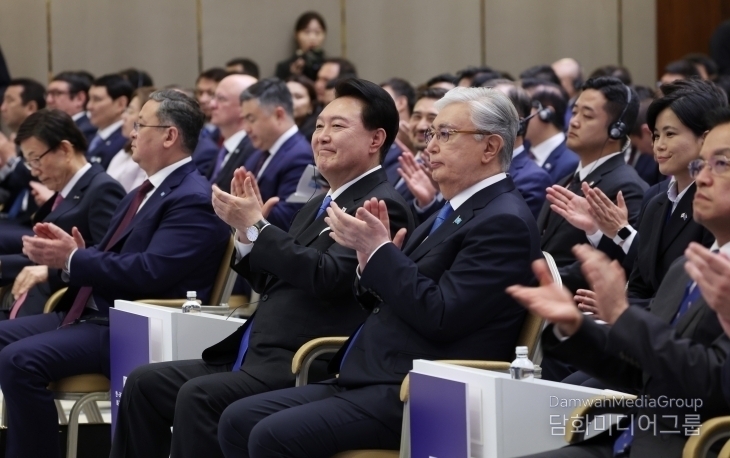By Kayla Lee | President Yoon Suk-yeol held a summit with Kazakhstan's President Kassym-Jomart K. Tokayev on June 12 (local time) and signed 37 memorandums of understanding (MOUs), including supply chain cooperation.
The MOUs laid the institutional foundation for strengthening bilateral cooperation on key minerals such as uranium, chromium, titanium, and bismuth, including lithium, a core material for batteries, from joint exploration to end-use.

Yoon arrived in Kazakhstan the night before and held a meeting with compatriots before holding a summit at the Akorda Presidential Palace in Astana, the capital of Kazakhstan, where they issued a joint statement.
In addition to the state luncheon, the two leaders also held three other social events, including a friendship dinner, a tour of the presidential palace, and tea and cultural performances, strengthening the strategic partnership between the two countries, which is celebrating its 15th anniversary.
Kazakhstan is rich in key minerals, possessing most of the minerals on the periodic table. It ranks first in the world in uranium production, second in chromium, third in titanium, fifth in bismuth, and 12th in crude oil reserves.
The two countries have signed an MOU on cooperation in the supply chain of key minerals, giving Korean companies priority in exploration, mining, and smelting for minerals that are identified as economically viable in the future. The two countries also agreed to continue to supply uranium from Kazakhstan to the Republic of Korea and to consider the possibility of increasing supplies in the future.
An MOU on cooperation in the power industry was also signed to help Korean companies win power contracts in Kazakhstan. The MOU with Kazakhstan's sovereign wealth fund (Samruk Kazyna) lays the groundwork for future projects, according to the presidential office, as it will apply Korean coal environmental equipment improvement technology to modernize Kazakhstan's thermal power plants.
A financial support cooperation MOU was also signed to support the participation of Korean companies in Kazakhstan's major infrastructure projects. "I called on President Tokayev to pay special attention to the participation and contribution of Korean companies in major state projects such as gas processing plants," Yoon said in a joint press release.
To expand people-to-people exchanges, direct flights between the two capitals, which have been suspended since 2020, will be operated twice a week. It will also increase service to Almaty.
Kazakhstan is a leader in denuclearization, having given up its nuclear weapons after independence. In a joint statement, President Tokayev expressed his firm support for the South Korean government's "bold initiative for a nuclear-free, peaceful and prosperous Korean Peninsula.
The two leaders affirmed their strict condemnation of North Korea's continued provocations and nuclear and missile development, and agreed to actively participate in the international community's efforts to cut off North Korea's illicit financing. President Tokayev also expressed his full support for the ROK government's K-Silk Road cooperation initiative in Central Asia.
"Kazakhstan, a resource-rich country, and South Korea, which has processing technology and related industries, should strengthen supply chain cooperation centered on key minerals," Yoon said at the Korea-Kazakhstan Business Forum held at the Hilton Astana Hotel later in the day.














